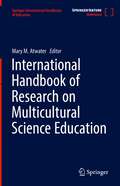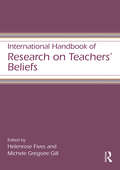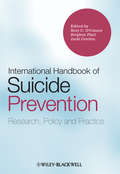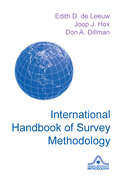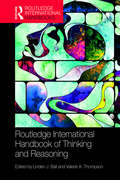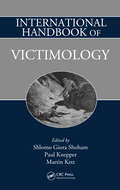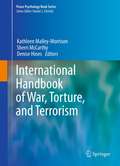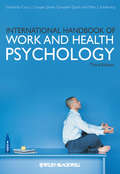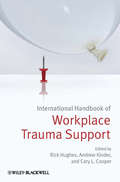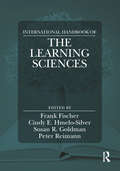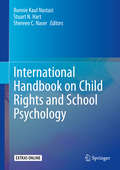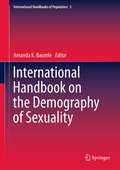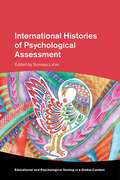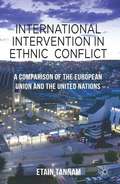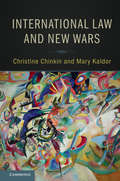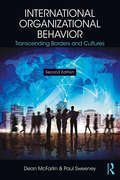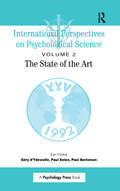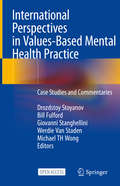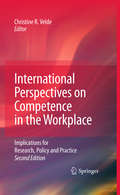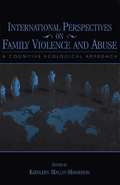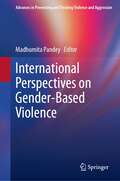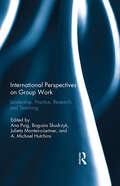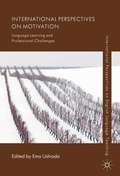- Table View
- List View
International Handbook of Research on Multicultural Science Education (Springer International Handbooks of Education)
by Mary M. AtwaterThis handbook gathers in one volume the major research and scholarship related to multicultural science education that has developed since the field was named and established by Atwater in 1993. Culture is defined in this handbook as an integrated pattern of shared values, beliefs, languages, worldviews, behaviors, artifacts, knowledge, and social and political relationships of a group of people in a particular place or time that the people use to understand or make meaning of their world, each other, and other groups of people and to transmit these to succeeding generations. The research studies include both different kinds of qualitative and quantitative studies. The chapters in this volume reflect differing ideas about culture and its impact on science learning and teaching in different K-14 contexts and policy issues. Research findings about groups that are underrepresented in STEM in the United States, and in other countries related to language issues and indigenous knowledge are included in this volume.
International Handbook of Research on Teachers' Beliefs (Educational Psychology Handbook)
by Helenrose Fives Michele Gregoire GillTeacher beliefs play a fundamental role in the education landscape. Nevertheless, most educational researchers only allude to teacher beliefs as part of a study on other subjects. This book fills a necessary gap by identifying the importance of research on teacher beliefs and providing a comprehensive overview of the topic. It provides novices and experts alike a single volume with which to understand a complex research landscape. Including a review of the historical foundations of the field, this book identifies current research trends, and summarizes the current knowledge base regarding teachers’ specific beliefs about content, instruction, students, and learning. For its innumerable applications within the field, this handbook is a necessity for anyone interested in educational research.
International Handbook of Suicide Prevention
by Jacki Gordon Rory C. O'Connor Stephen PlattThe International Handbook of Suicide Prevention showcases the latest cutting-edge research from the world's leading authorities, and highlights policy and practice implications for the prevention of suicide. Brings together the world's leading authorities on suicidal behaviour, renowned for their suicide prevention research, policy and practiceAddresses the key questions of why people attempt suicide, the best interventions, treatments and care for those at risk, and the key international challenges in trying to prevent suicideDescribes up-to-date, theoretically-derived and evidence-based research and practice from across the globe, which will have implications across countries, cultures and the lifespan
International Handbook of Survey Methodology (European Association of Methodology Series)
by Don A. Dillman Joop J. Hox Edith D. de LeeuwTaking into account both traditional and emerging modes, this comprehensive new Handbook covers all major methodological and statistical issues in designing and analyzing surveys. With contributions from the world's leading survey methodologists and statisticians, this invaluable new resource provides guidance on collecting survey data and creating meaningful results. Featuring examples from a variety of countries, the book reviews such things as how to deal with sample designs, write survey questions, and collect data on the Internet. A thorough review of the procedures associated with multiple modes of collecting sample survey information and applying that combination of methods that fit the situation best is included. The International Handbook of Survey Methodology opens with the foundations of survey design, ranging from sources of error, to ethical issues. This is followed by a section on design that reviews sampling challenges and tips on writing and testing questions for multiple methods. Part three focuses on data collection, from face-to-face interviews, to Internet and interactive voice response, to special challenges involved in mixing these modes within one survey. Analyzing data from both simple and complex surveys is then explored, as well as procedures for adjusting data. The book concludes with a discussion of maintaining quality. Intended for advanced students and researchers in the behavioral, social, and health sciences, this "must have" resource will appeal to those interested in conducting or using survey data from anywhere in the world, especially those interested in comparing results across countries. The book also serves as a state-of-the-art text for graduate level courses and seminars on survey methodology. A companion website contains additional readings and examples.
International Handbook of Thinking and Reasoning (Routledge International Handbooks)
by Linden J. Ball Valerie A. ThompsonThe Routledge International Handbook of Thinking and Reasoning is an authoritative reference work providing a balanced overview of current scholarship spanning the full breadth of the rapidly developing and expanding field of thinking and reasoning. It contains 35 chapters written by leading international researchers, covering foundational issues as well as state-of-the-art developments in thinking and reasoning research. <P><P>Topics covered range across all sub-areas of thinking and reasoning, including deduction, induction, abduction, judgment, decision making, argumentation, problem solving, expertise, creativity and rationality. The contributors engage with cutting-edge debates such as the status of dual-process theories of thinking, the role of unconscious, intuitive, emotional and metacognitive processes in thinking, and the importance of probabilistic conceptualisations of thinking and reasoning. Authors also examine the importance of neuroscientific findings in informing theoretical developments, and explore the situated nature of thinking and reasoning across a range of real-world contexts such as mathematics, medicine and science. <P><P>The Handbook provides a clear sense of the way in which contemporary ideas are challenging traditional viewpoints as "new paradigm of the psychology of reasoning" emerges. This paradigm-shifting research is paving the way toward a richer and more inclusive understanding of thinking and reasoning, where important new questions drive a forward-looking research agenda. It is essential reading for both established researchers in the field of thinking and reasoning as well as advanced students wishing to learn more about both the historical foundations and latest developments in this rapidly growing field.
International Handbook of Victimology
by Paul Knepper Shlomo Giora Shoham Martin KettIn the nearly four decades since the First International Symposium on Victimology convened in Jerusalem in 1973, some concepts and themes have continued to hold a prominent place in the literature, while new ones have also emerged. Exploring enduring topics such as conceptions of victimhood, secondary and hidden victimization, and social services f
International Handbook of War, Torture, and Terrorism
by Kathleen Malley-Morrison Denise Hines Sherri MccarthyInternational Handbook of Reconciliation and Negotiation follows up on the research gathered from the PAIRTAPS (Perspectives on Govermental Aggression and Peace) survey that was administered in over 40 countries worldwide. Where the International Handbook of Government Aggression and Peace focuses on governmental acts of aggression and violence, this book highlights the many actions taken worldwide to secure the rights of individuals to peace and protest, as examined from a theoretical standpoint. The book has both a theory base as well as empirical findings that should appeal to researchers across several disciplines including peace psychology, political science, and sociology.
International Handbook of Work and Health Psychology
by Cary L. Cooper James C. Quick Marc J. SchabracqNow in its third edition, this authoritative handbook offers a comprehensive and up-to-date survey of work and health psychology. Updated edition of a highly successful handbook Focuses on the applied aspects of work and health psychology New chapters cover emerging themes in this rapidly growing field Prestigious team of editors and contributors
International Handbook of Workplace Trauma Support
by Cary L. Cooper Rick Hughes Andrew KinderThe International Handbook of Workplace Trauma Support provides a comprehensive overview of contemporary standards and best practices in trauma support that draws from the latest research findings and experience of international experts in the field.Reviews the major contemporary post-trauma intervention models in both theory and practiceIncludes Trauma Risk Management (TRiM), Support Post Trauma (SPoT), Eye-Movement Desensitization and Reprocessing (EMDR), Mindfulness and Psychological First Aid (PFA)Incorporates multi-cultural perspectives by reporting on the pervasive violence in South Africa, constant threats in Israel and emerging developments in ChinaIncludes social, psychosocial, psychological, and organizational dimensions to offer a detailed mapping of trauma supportProvides latest thinking for supporting those in the military context
International Handbook of the Learning Sciences
by Peter Reimann Frank Fischer Cindy E. Hmelo-Silver Susan R. GoldmanThe International Handbook of the Learning Sciences is a comprehensive collection of international perspectives on this interdisciplinary field. In more than 50 chapters, leading experts synthesize past, current, and emerging theoretical and empirical directions for learning sciences research. The three sections of the handbook capture, respectively: foundational contributions from multiple disciplines and the ways in which the learning sciences has fashioned these into its own brand of use-oriented theory, design, and evidence; learning sciences approaches to designing, researching, and evaluating learning broadly construed; and the methodological diversity of learning sciences research, assessment, and analytic approaches. This pioneering collection is the definitive volume of international learning sciences scholarship and an essential text for scholars in this area.
International Handbook on Child Rights and School Psychology
by Bonnie Kaul Nastasi Stuart N. Hart Shereen C. NaserThis handbook examines the meanings, implications, and transformative potential of a child-rights approach for school psychology. It focuses on the school community, in which psychology is committed to promoting well-being, learning, and development of all children. The handbook begins with an overview of the 1989 United Nations Committee on the Rights of the Child (CRC) and explores main themes such as, survival, protection, development, participation, and nondiscrimination. Chapters provide guidance in promoting and protecting child rights when dealing with critical issues relevant to the school community, including well-being, freedom from violence, and access to high quality education. In addition, chapters analyze and offer recommendations for child rights applications within the roles and responsibilities of school psychologists. The handbook concludes with future directions for achieving a child-rights approach for school psychology. Topics featured in this handbook include:The current status of child rights in the international community.Accountability for child rights by school psychology.Collaborative home, school, and community practices aimed at promoting family support.Protecting child rights within the realm of competitive sports.CRC and school-based intervention programming.Promoting child rights through school leadership.Applying child rights-respecting research to the study of psychological well-being. The International Handbook on Child Rights and School Psychology is a must-have resource for researchers, scientist-practitioners, clinicians, and graduate students in child and school psychology, educational policy and politics, social work, public health, and other school-based or child-serving mental health disciplines.
International Handbook on the Demography of Sexuality
by Amanda K. BaumleThe International Handbook on the Demography of Sexuality is the first book to specifically address the study of sexuality from a demographic perspective. Demographic research has largely paid little attention to sexuality as a whole, or sexual orientation in particular, other than in studies examining the "consequences" of sex - sexually transmitted infections or fertility. Instead, the content of this handbook explores population sexuality in order to describe the prevalence of sexual behaviors, desires, and identities, as well as their connections with other demographic outcomes. The focus is on analyzing sexuality as a demographic topic in its own right, rather than solely as a variable in studies of sexually transmitted infection or other health-related topics. In this book, both researchers with traditional demographic backgrounds, as well as those with training in other disciplines, provide an overview of the state of current research on population sexuality. These chapters provide a foundation for the development of research in the burgeoning field of the demography of sexuality.
International Histories of Psychological Assessment (Educational and Psychological Testing in a Global Context)
by Sumaya LaherTo look forward, it is necessary to look back and learn. History is more than just facts about the past; it is a narrative told from a particular perspective. A proverb from Africa, 'Until lions have their own historians, tales of the hunt shall always glorify the hunter,' captures this best. Most of the scholarship about psychological assessment comes from very specific nationalities and cultures, which does not truly reflect the diversity and breadth of histories pertaining to the field. Covering 50 countries, this collection gives voice to those that have previously been under represented and sometimes marginalized. This book not only describes important moments in psychological assessment from around the globe, but also equips readers with the tools to map the future of psychological assessment across nations. It advocates for a more globally inclusive science of assessment that holds promise for enhancing creativity and innovation in the field.
International Intervention in Ethnic Conflict
by Etain TannamThe EU and the UN have become increasingly involved in conflict resolution, yet they are rarely compared systematically. This book focuses on the role of bureaucracies in the European Union (EU) and the United Nations (UN) when dealing with conflict. Tannam's comparative analysis of EU and UN policy-making procedures explores how and why they differ from each other, arguing that the UN Secretariat and the European Commission have autonomy under certain conditions and that reducing explanations of EU and UN policy outcomes to political will, or to the preferences of member states is inaccurate. This unique empirical study, enhanced by interviews with practitioners, will be a valuable resource for scholars of International Relations, Peace Studies and Comparative Politics.
International Law and New Wars
by Mary Kaldor Christine ChinkinInternational Law and New Wars examines how international law fails to address the contemporary experience of what are known as 'new wars' - instances of armed conflict and violence in places such as Syria, Ukraine, Libya, Mali, the Democratic Republic of Congo and South Sudan. International law, largely constructed in the nineteenth and twentieth centuries, rests to a great extent on the outmoded concept of war drawn from European experience - inter-state clashes involving battles between regular and identifiable armed forces. The book shows how different approaches are associated with different interpretations of international law, and, in some cases, this has dangerously weakened the legal restraints on war established after 1945. It puts forward a practical case for what it defines as second generation human security and the implications this carries for international law.
International Organizational Behavior: Transcending Borders and Cultures
by Dean McFarlin Paul SweeneyThis book focuses on understanding and managing organizational behavior in an international context, considering the conceptual framework of culture and offering practical advice for navigating cultures in the workplace. Readers will gain new tools to interpret behavior, helping them to manage international challenges effectively. The authors outline the critical management and adaptation skills necessary to develop within a globalized organization, teaching the reader how to recruit, coordinate, and evaluate an international team. Updated "Culture Clash" and "Global Innovations" boxes provide important insights into identifying a core set of values to "customize" management techniques across cultures, focusing particularly on growing countries like India and China. The new edition features a more streamlined chapter structure, updated discussion questions, and new end-of-chapter cases with self-scoring quizzes for further development. International Organizational Behavior will prove a valuable resource for any student of organizational behavior, international management, and international business. A companion website provides additional support for instructors, featuring an instructor’s manual, test bank, and PowerPoint slides.
International Perspectives On Human Development
by Anna Laura Comunian Uwe Peter GielenThis volume is intended to be read by psychologists, cultural and psychological anthropologists, and graduate students interested in international and cross-cultural contributions to the study of the human life cycle. The book should be of interest to both teachers and researchers. The idea of developing such a broadly conceived book arose in connection with the Regional Conference of the International Council of Psychologists held in Padua University, Italy between July 21-23, 1997. The theme of the conference was Cross-cultural Perspectives on Human Development. This highly successful venture brought together 105 participants from 28 countries who for three days discussed their cross-cultural research in an atmosphere of warmth and enthusiasm. The conference had been organized by a Scientific Committee consisting of Anna Laura Comunian, Uwe P. Gielen, George De Vos, and Gustav Jahoda. They took care of countless organizational details and made memorable the stay of the conference participants at the "Bo," one of Europe's oldest universities. The university has two of Europe's largest psychology departments and provided an ideal setting for both formal and informal scientific exchange.
International Perspectives On Psychological Science, II: The State of the Art
by Paul Eelen Gery d'Ydewalle Paul BertelsonThe essays appearing in these two volumes are based on Keynote (Vol. 1) and State-of-the-Art (Vol. 2) Lectures delivered at the XXVth International Congress of Psychology, in Brussels, July 1992. The Brussels Congress was the latest in a series of conferences which are organized at regular intervals under the auspices of the International Union of Psychological Science (IUPsyS), the main international organization in the field of Scientific Psychology. The first of those meetings took place in Paris in 1889. An important function of the International Congresses is to promote communication between different specializations in Psychology. Speakers were therefore asked to present lectures and discussions in their own fields of study, in a way that would be accessible to fellow psychologists active in other fields. State-of-the-Art lecturers were specifically asked to prepare a tutorial review on a topic which, in the view of the Program Committee, had recently given rise to particularly important developments. These contributions are included in Volume Two. Keynote lecturers were left free to address whatever subject they felt was of greatest interest. The chapters in Volume 1 are preceded by the Presidential Address by Mark R. Rosenzweig.
International Perspectives in Values-Based Mental Health Practice: Case Studies and Commentaries
by Giovanni Stanghellini Bill Fulford Drozdstoy Stoyanov Werdie Van Staden Michael Th WongThis open access book offers essential information on values-based practice (VBP): the clinical skills involved, teamwork and person-centered care, links between values and evidence, and the importance of partnerships in shared decision-making. Different cultures have different values; for example, partnership in decision-making looks very different, from the highly individualized perspective of European and North American cultures to the collective and family-oriented perspectives common in South East Asia. In turn, African cultures offer yet another perspective, one that falls between these two extremes (called batho pele).The book will benefit everyone concerned with the practical challenges of delivering mental health services. Accordingly, all contributions are developed on the basis of case vignettes, and cover a range of situations in which values underlie tensions or uncertainties regarding how to proceed in clinical practice. Examples include the patient’s autonomy and best interest, the physician’s commitment to establishing high standards of clinical governance, clinical versus community best interest, institutional versus clinical interests, patients insisting on medically unsound but legal treatments etc. Thus far, VBP publications have mainly dealt with clinical scenarios involving individual values (of clinicians and patients). Our objective with this book is to develop a model of VBP that is culturally much broader in scope. As such, it offers a vital resource for mental health stakeholders in an increasingly inter-connected world. It also offers opportunities for cross-learning in values-based practice between cultures with very different clinical care traditions.
International Perspectives on Competence in the Workplace
by Christine R. VeldeAs the world's economy develops into a more dynamic, fast-moving, and unpredictable entity, it is crucial that the workers who create wealth have the ability to assess and respond to new and unforeseen challenges. In other words, the future will require a more competent workforce. What, though, does this mean in practice? In this, the fully revised second edition of Christine Velde's book, a variety of researchers from around the world provide a truly international perspective on the issue. They help to redefine the term competence. Rather than responding to challenges using a pre-existing set of skills, they see competence as having the ability to assess new situations, and then adapt one's response accordingly, particularly in collaboration with others. Providing the reader with insightful perspectives about competence in different situations and contexts, the book's sections explore the concept of competence in industry and vocational education, in schools and colleges, in small businesses and companies, and in universities. The interpretation, experience and teaching of competence in the workplace is boiled down to five essential components that in themselves represent an argument for a more holistic conception of competence. Velde herself concludes the book by synthesizing and reflecting on the contents. This book provides the reader with insightful perspectives on competence, and the characteristics of learning environments in different workplace contexts. Drawing on phenomenographic insights allows it to present a more enlightened view of competence, at the same time as opening up an international dialogue about the meaning and interpretation of competence in the workplace. Useful not only to educators and researchers, this volume will also assist leaders and managers in a variety of contexts to develop more meaningful workplaces.
International Perspectives on Family Violence and Abuse: A Cognitive Ecological Approach
by Kathleen Malley-MorrisonIn this book, in which definitions and examples of abuse from men and women from every continent and a very diverse set of backgrounds are considered. The volume provides information on the extent to which family violence is a recognized problem in each country, research findings available on different forms of family violence, and information on governmental responses to family violence. Finally, the value of an international human rights approach to abuse and violence in families is considered. The book presents an unparalleled international coverage, addressing all forms of family violence in Australia and at least two countries from every other continent. Each chapter begins by describing the cultural context in which family violence and abuse take place. These sections emphasize the role of women and children in the country. Providing a multitude of voices, each chapter includes fascinating and often dramatic definitions and examples of abuse from ordinary citizens of the country. The concluding chapter elaborates on the appropriateness of a human rights approach in addressing family violence cross-nationally and cross-culturally; and provides an excellent integration of much of the material from the previous chapters. The book is intended for advanced undergraduates and graduate students in psychology and sociology, as well as pre-professionals and professionals in medicine, law, and social services. It has strong relevance and value to individuals training in counseling (counselor education) and clinical psychology. Because of its readable style and extensive use of quotations from citizens of the countries studied for the book, it may also appeal to a much broader audience, including a lay audience.
International Perspectives on Gender-Based Violence (Advances in Preventing and Treating Violence and Aggression)
by Madhumita PandeyThis book examines the multifaceted nature of gender-based violence (GBV) and the many forms it can take. It explores the area of GBV and its implications on human rights, law, and policy. The book highlights the significance of current international debates around preventing GBV and provides context for understanding GBV as a complex structural phenomenon deeply rooted in gender inequality. It addresses GBV as one of the most notable human rights violations within all societies and provides multiple global perspectives on GBV to address the common challenges and barriers to combating this issue.Key areas of coverage include:Sexual violence.Domestic violence.Intimate partner violence.Media Misogyny.Online trolling.Discrimination.Sex trafficking and modern slavery.Preventative Measures and role of men.International Perspectives on Gender-Based Violence is an essential resource for researchers, clinicians/therapists, and upper-level undergraduate and graduate students in developmental psychology, family policy, forensic psychology, human rights, public health, criminology/criminal justice, and clinical social work as well as all interrelated disciplines.
International Perspectives on Group Work: Leadership, Practice, Research, and Teaching
by Ana Puig Bogusia Skudrzyk Julieta Monteiro-Leitner A. Michael HutchinsThe counselling profession in the United States is calling for increased international collaboration, engagement, and understanding of the global issues which impact the way in which counsellors conduct their professional practice, teaching, and research. This book captures the experiences of group workers the world over, inviting them to describe how they facilitate group work to restore wellness, promote healing, and create opportunities for reducing isolation and alienation by tapping into the wisdom of multicultural or indigenous practices. The group work profession underscores the importance of training and service delivery that is rooted in humanistic narratives, with a focus on understanding cross-cultural dynamics. Included in this collection are examples of the rich, creative, and diverse world of group work applications, all of which contribute to a greater knowledge, awareness, and understanding of the many ways in which the power of group membership and leadership can be harnessed for positive change. Group work teachers, practitioners, and counsellor educators will enjoy learning about these creative and important efforts, and take away ideas to implement in their own group work. This book was originally published as two special issues of The Journal for Specialists in Group Work.
International Perspectives on Intimate Partner Violence: Challenges and Opportunities (AFTA SpringerBriefs in Family Therapy)
by Sandra M. Stith Chelsea M. SpencerThis book examines international perspectives on intimate partner violence (IPV). It highlights the current state of IPV prevention and intervention efforts across countries, including Colombia, Iran, Russia, China, India, Turkey, Nigeria, the United Kingdom, Finland, and the United States. The book examines the countries of origin in context (e.g., population, area, religion, ethnic diversity) and includes current rates of IPV in each country. In addition, it addresses growth areas and challenges regarding IPV prevention and intervention, including legal issues as well as cultural and social contexts and their relation to IPV – and the clinical interventions used – within each country. The book discusses challenges and opportunities for growth and seeks to gain a more robust and systemic perspective on the global phenomenon of IPV. It examines how larger social, cultural, and global factors affect the lives of the individuals whom family therapists serve and advocate for as well as provide guidance for culturally appropriate clinical and prevention practices. Key areas of coverage include: · International perspectives on intimate partner violence. · Intervention and resources available for victims of intimate partner violence. · Policies and laws relating to intimate partner violence. International Perspectives on Intimate Partner Violence is an essential resource for clinicians, therapists, and practitioners as well as researchers, professors, and graduate students in family studies, clinical psychology, and public health, as well as all interrelated disciplines.
International Perspectives on Motivation
by Ema UshiodaBringing together motivation-related practical concerns and debates from diverse international contexts and educational settings where English is learned, this book shows how locally produced insights and issues can have wider global significance, resonating with the experiences and concerns of English teachers and learners across the world.
